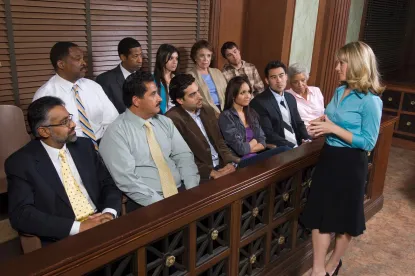At the start of the pandemic, it was hard to imagine that jury research conducted on a video platform would provide insights close to those we gained through our in-person focus group and mock trial exercises. But challenge drives innovation. After conducting a number of online research exercises, we have learned that with smart research design, dynamic presentations, skilled facilitation, and rigorous recruiting, virtual research supports rich discussion of case issues and yields invaluable insights for trial prep.
Online jury research is not the same as in-person research, in the same way that a phone call with a friend is not the same as a visit over coffee, yet both are valuable ways to socialize. When we cannot be there in person, online jury research allows us to continue to conduct meaningful research with prospective jurors in any venue.
Here are some key tips to get the most out of online jury research and use it innovatively to strategically prepare for trial.
-
Don’t let the perfect be the enemy of the good.
When deciding whether to invest in online jury research now or to wait until in-person research again becomes feasible, the adage “don’t let the perfect be the enemy of the good” rings true. Conducting research sooner rather than later maximizes the potential to leverage strategic insights. Following mock trials, we have heard countless clients say that if they had done the research sooner, they would have been better positioned to fully capitalize on the findings.
We are encouraging clients to use the gift of time that trial delays have afforded them. Conducting virtual research in the near terms offers more possibilities to apply key findings and strategy recommendations. And remember, to the extent in-person research is even feasible right now, it would require mask wearing and a whole range of social distancing protocols. It is clear, the choice for the foreseeable future is between virtual research and socially distanced, in-person research, when and where the latter format is a possibility.
-
Design for engagement.
We associate screens with fractured attention, but the potential for distraction can be reduced through the careful design of online research. At IMS ExpertServices, we do this in three ways.
First, we work closely with clients to ensure their presentations are clear, compelling, and designed for engagement. Attorney presentations should be tight and supported with lively visuals. Well-designed graphics are imperative when presenting a case through a virtual format, as they pique jurors’ interest and hold their attention, overcoming the limitations of the screen.
Second, by keeping our panels small, we consistently ensure rich, engaging, insightful discussions about case issues. We have found that breaking a larger mock jury pool into consultant-led groups of six to eight participants is ideal. Closely monitored, small groups encourage participants to stay on task.
Third, we are skillful facilitators of the case presentations. By deftly transitioning to each of the presentations, regularly gathering feedback through polls and surveys, and encouraging open discussion more frequently than we typically do during in-person exercises, we ensure engagement is maintained. Knowledgeable facilitators are a crucial component of successful online research.
-
Set the stage for success.
We all know that video conference fatigue is real. To ensure that participants are fresh and engaged for the substantive part of the research exercise, we conduct an orientation session a day or two in advance. During this session we train participants in the technology, resolve any connectivity issues, review confidentiality agreements, and have participants complete background questionnaires. By seeing to these tasks in advance, we ensure the actual research exercise can start on time and that participants will be fresh and engaged during it.
Conducting research with participants who are in their own homes presents a unique set of challenges. We require participants to participate in the research from a private, quiet room free from distractions, but at a distance we are far less able to control their behavior. The orientation session provides participants with the opportunity to review our code of conduct and learn our expectations for their behavior, and it enables us to vet participants. If we identify participants who are likely to be non-compliant, who have technology issues, or who appear not to have a space suitable to allow for proper attentiveness, we can exclude them from the research exercise.
-
Think outside the box.
The virtual format is enabling us to think more creatively and innovatively about jury research, including research designs that previously would have been cost prohibitive for all but the most significant cases. IMS recently conducted online focus groups on the impacts of Covid-19 and emergent litigation arising from the pandemic. Without ever getting on a plane, and in the span of a single week, we were able to talk to dozens of participants in Los Angeles, Houston, and New York City.
Online jury research is a tool to innovatively prepare for trial. The online format is well suited to an iterative approach to research, including exploratory research early in discovery when insights can be leveraged to maximum advantage, A/B testing, or research in multiple venues. It is also well suited to an in-depth examination of a key aspect of a case or testing an expert witness’s ability to effectively communicate.
-
Reduce risk with a virtual research back-up plan.
Between localized outbreaks, mandatory fourteen-day-quarantine requirements for visitors to some regions, and the ever-looming potential for a second wave of cases, there will continue to be uncertainty around our ability to conduct in-person research in the near term. When planning in-person research, be prepared to pivot to an online exercise if the circumstances dictate. We have modified our recruiting protocols to recruit participants who are qualified for both in-person and on-line research, and if need be, we can quickly switch over to either form of research exercise.
We look forward to the day when we can return to in-person research. In the meantime, well designed virtual focus groups and mock trials are an effective way to learn how prospective jurors respond to arguments, themes, and evidence. As the world is changing rapidly during these unprecedented times, ascertaining how jurors react to your case–and why–is perhaps all the more important.




 />i
/>i

